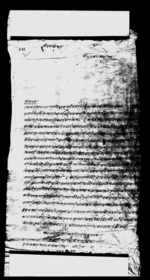A petition by Kamalākānta Upādhyāya to be allowed to retain his priestly duties at a Umāmaheśvara temple in Patan (VS 1962)
ID: K_0355_0060
Edited and
translated by Ramhari Timalsina
Created: 2019-05-03;
Last modified: 2019-11-26
For the metadata of the document, click here
The accompanying edition, translation/synopsis and/or commentary are available under the terms of the Creative Commons Attribution-ShareAlike 4.0 International License
Abstract
This is a petition Kamalākānta Upādhyāya of Patan’s Svatha Ṭola submitted (probably to Prime Minister Candra Śamśera) in the hope that he could continue on as priest at a Umāmaheśvara temple in Patan in the face of a competing claim by Sahadatta Miśra of Mahāpāla Ṭola.Diplomatic edition
[1r]
1⟪246⟫1श्रीउमामहेश्वर १1श्रीधनकुटामाहाराज २1विन्तिपत्र2उप्रान्तगरीप्रवरकरुणानिधानपाटंदर्वारनेराढुंगादेवल्मास्थापितभयाका¯ ¯ ¯१कानित्य
3पुजागर्नेषर्चपुजाहारिषान्गीकेहीनभयापनिसनातन्पुर्षादेषीमेरादाज्यूभाइलेआलो
4पालोगरीनित्यपुजागरीचलाईआयाकोमा¯ ¯ ¯२कापाटंसिंधुरजात्राभैवक्संदादर्वार[?]
5पुजाकावन्दोवस्तनभयाकादेवलहरूमापुजाहारीकोवन्दोवस्तगरिदिनुभंनेहुकुंहुंदायस[?]
6वलमापुजाहारीषान्गीकोवन्दोवस्तहुनलाग्योभनीपाटंमाहापालवस्नेसहदत्तमिश्रले
7सोदेवालयेमापुजाहारीषान्गीषानाकालागीतालचा१जोरल्याईतालचामारीनिजले
8नित्यपुजाचलाउनआयाकोहुनालेसनातनदेषीहामिलेनित्यपुजागरीआयाकादेवालयेमा
9निजलाईनित्यपुजागर्नदिंनभनिहामिलेरोकिदिदाझगडाभयोरसोझगडाभयादेषीसोदेवालयको
10तालचापोतावाटलगीपुजासिद्धीयापछीपोतामावुझाउनुभनिसाचोपोतामाराषेकोरनिजलेसोषान
11गीषानाकोलोभलेझुठाविन्तिचढाईपाटंपोतामातोकाईषान्गीझेलगर्नलागिरहेछभनीले
12षियाकावेहोरासंगअघीपुजाषर्चपुजाहारिषान्गीनभयापनिसनातनदेषीहामिहरुले[?]
13जागरीआयाकादेवालयेमा¯ ¯ ¯२कासिंधुरजात्रापछीलेषियाकावेहोरासंगषिचोला
14गरीपुजागर्योभंदैमासोपुजाहारीषान्गीनिजलेपाउनेहामिसनातनदेषीपुजागर्नेले
15नपाउनेहुनुपर्नेहोईनयस्पालिपानीकाउत्सवमाआफुआफुलेपुजागरेकादेवलरदेव[?]
16पनिआफुआफुलेसफागरीराषनुभंनेउर्दीहुदापनिमेरैषर्चलगाईसफागरेकोरस
17नातन्देषीहामिहरुलेनित्यपुजागरीआयाकादेषनेथाहापाउनेमानीसस्मेत्षडा[?]
18प्रभुयस्माअघीदेषीइनैउपाध्याहरुलेनित्यपुजागरीआयाकोरहेछभंनेवुझीइनैउपाध्या
19कानाउमादर्तागरीसोनिकासाभयाकापुजाहारीषर्चइनैलाईदिनुभंनेपाटंपोतालाईप्र[?]
20गीवक्सेसर्कारकोजयेमनाई¯ ¯ ¯१कानित्यपुजारोजिन्दाचलाइवस्दाहुंजोमर्जि ¯ ¯ ¯ ¯ ¯ ¯
21सदातावेदारपाटंस्वथटोलवस्नेकमलाकान्त
22उपाध्यायेकाचतुर्वेदोक्तस्वस्तीस्वस्ती ---
23ईतिसम्वत् १९६२ सालकार्तिक[...]गतेरोज[...]शृ ¯ ¯ ¯ ¯ ¯ ¯
Translation
[1r]
Number 2461
Glorious Umāmaheśvara 1
Venerable Dhanakuṭā Mahārāja 2
Petition
Uprānta. O shelter of the poor, treasure of compassion! I and my brothers have been performing daily ritual worship by turns at the stone temple of -1- (i.e. Umāmaheśvara) situated in the vicinity of the Patan palace. We have been carrying out this duty since earlier generations, even when expenses for the daily worship and a priestly emolument were unavailable. When the siṃdhurajātrā2 of -2- (i.e. Venerable Dhanakuṭā Mahārāja3 ) in Patan took place, he ordered that priests for ritual worship be arranged by the palace in temples where daily worship was not being performed. Thinking that arrangements were being made to provide a priestly emolument to this temple, Sahadatta Miśra, a resident of Patan[’s] Mahāpāla [Ṭola], brought a pair of locks, locked the temple and came to perform the daily ritual worship. Therefore, not wanting to allow him to perform the daily ritual at the temple where we had been doing so, we impeded him, and a dispute arose. Ever since, the keys have been with the potā,4 [which] has told [us] to take the keys from the the potā and return [them] to the potā once the daily worship ends. [Now] we have come to know that he, driven by greed, has begun acting deceitfully [to obtain] the emolument by an appointment through the Patan potā. Therefore given this detail, together with the one mentioned above, that we have been performing the worship for generations, even when no expenses for the worship and priestly emolument were provided, and that he started interfering and performing [daily] worship after the Dhanakuṭā Mahārāja’s siṃdhurajātrā, then certainly it should not be that he gets the priestly emolument and we who have performed the task for generations do not. This year, when an official order was issued to those who perform worship as priests at temples and to deities to clean them for the water festival,5 I cleaned the temple at my own expense. There are people who see and know that we have been performing the daily ritual worship for many generations. Lord, in this matter, if you could kindly consider that these Upādhyāyas (i.e. Kamalākānta Upādhyāya and his brothers) have been performing the daily ritual worship, and thence kindly give the order to the Patan potā to register [the duty] in the name of the Upādhyāyas and to grant the approved priestly emolument to them, we will hail you and perform the daily worship for -1- (i.e. Umāmaheśvara). [We shall obey] whatever [you] order.
May it be well [with you]! May it be well!—as said in the Four Vedas—from Kamalākānta Upādhyāya, [your] servant ever, a resident of Svatha, Patan.
Kārttika in the [Vikrama] era year 1962 (1905 CE).
Commentary
There are a number of Umāmaheśvara temples in Patan. This document describes the one in question as a ḍhuṅgā devala (i.e. a temple made of stone) located in the vicinity of the Patan palace. This pins it down to the one identified as LAL1190 in DANAM (see https://nhdp-test.kjc.uni-heidelberg.de/report/34d6f310-e5e3-11e9-8bc4-0242ac130002).

